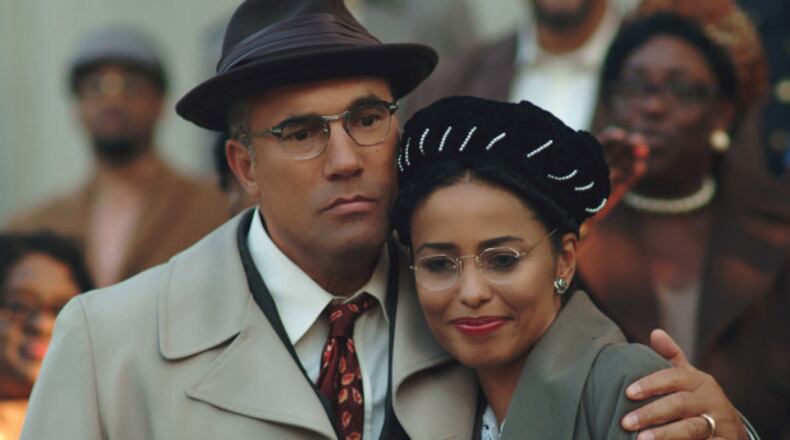Posted Thursday, February 8, 2018 by RODNEY HO/rho@ajc.com on his AJC Radio & TV Talk blog
Rosa Parks is known as a low-key seamstress who refused to give up her seat to a white man on a bus in Montgomery, Ala. in 1956, leading to bus boycotts and a civil rights revolution. She eventually became a civil rights icon.
But as shown in TV One's film "Behind the Movement," shot in Atlanta last year and airing Sunday, there was far more strategy involved.
"This image of her as a very docile woman made people feel safer," said Meta Golding, who stars as Parks, to the New York Post. "In reality, she was a seasoned activist."
The film also shows the other players who organized the boycott, including civil rights leader E.D. Nixon, portrayed by "Grey's Anatomy" vet Isaiah Washington.
Washington on the set of the film said Nixon is given short shrift in history, less for what he did for the civil rights cause but more for who he was. He was a rabble-rousing, self-proclaimed Socialist. He was also a smart strategist who helped select Parks because she not only had a true heart of a social justice warrior but also an unblemished record and respectable demeanor.
"In newspapers at the time, he said he was the fire but Mrs. Parks was the spark," Washington said. "I'm proud to be able to breathe some life into a person who for whatever reason wasn't given his proper due."
By the time Nixon died in 1984, Washington added, "he was disappointed history had forgotten him. For whatever reason, the narrative became Martin Luther King and Rosa Parks as the visionaries, the innovators, the people who created the Montgomery Bus Boycott."
In the film, Nixon is shown telling others that "we cannot be concerned with about what white folks think and do! We can't be living like that. I mean, it's 1955 and we're still following the same rules as Jim Crow in the 1890s!"
Then he tells Parks: "We stand to fight or we remain slaves!"
Despite her husband Raymond Parks (Roger Guenveur Smith) expressing worry that she might be hurt or killed by cops or vigilantes, she maintained her courage and chose to become the symbol of the movement "You don't scare so good," he said in the film, admirably. "You're so strong."
Jo Ann Robinson was another key point person in Montgomery organizing the boycott.
"It took three years to organize," said Loretta Devine, another "Grey's Anatomy" alum, who played Robinson, a professor at the time. "She was so powerful in making it happen. She's very well spoken. She demands attention."
Devine hopes a younger generation will watch the film and appreciate what their ancestors did for them.
"People fought for the rights you have," she said. "Young people need to know that and be reminded of that."
TV PREVIEW
"Behind the Movement," 7 p.m. Sunday, TV One
About the Author






